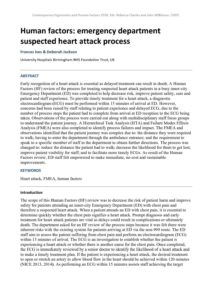| Document | Author Frances Ives & Deborah Jackson |
| Abstract Early recognition of a heart attack is essential as delayed treatment can result in death. A Human Factors (HF) review of the process for treating suspected heart attack patients in a busy inner-city Emergency Department (ED) was completed to help decrease risk, improve patient safety, care and patient and staff experience. To provide timely treatment for a heart attack, a diagnostic electrocardiogram (ECG) must be performed within 15 minutes of arrival at ED. However, concerns had been raised by staff relating to patient experience and delayed ECG, due to the number of process steps the patient had to complete from arrival at ED reception to the ECG being taken. Observations of the process were carried out along with multidisciplinary staff focus groups to understand the patient journey. A Hierarchical Task Analysis (HTA) and Failure Modes Effects Analysis (FMEA) were also completed to identify process failures and impact. The FMEA and observations identified that the patient journey was complex due to: the distance they were required to walk; having to enter the department through the ambulance entrance; and the requirement to speak to a specific member of staff in the department to obtain further directions. The process was changed to: reduce the distance the patient had to walk; decrease the likelihood for them to get lost; improve patient visibility for staff; and to facilitate more timely ECGs. As result of the Human Factors review, ED staff felt empowered to make immediate, no-cost and sustainable improvements. |

